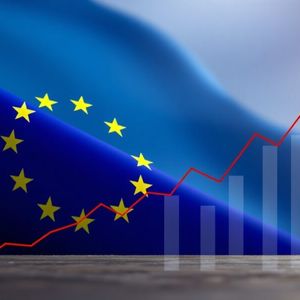BitcoinWorld EU Tariffs: Fitch Unveils Resilient Sovereign Ratings Amidst Trade Shifts In a world grappling with ever-shifting global trade landscapes and geopolitical tensions, the stability of national economies is under constant scrutiny. For investors, policymakers, and citizens alike, the pronouncements of major credit rating agencies like Fitch Ratings carry significant weight. Recently, a crucial piece of news emerged, offering a measure of reassurance amidst the uncertainty: Fitch has stated that new EU Tariffs , while impactful, are not expected to trigger immediate sovereign rating cuts for European Union member states. This declaration provides a vital insight into the current economic resilience of the bloc and prompts a deeper look into what truly underpins a nation’s financial health. Understanding Fitch’s Stance: Will EU Tariffs Really Not Bite? The announcement from Fitch Ratings comes at a time when trade protectionism is gaining traction globally, with various regions implementing measures to safeguard domestic industries. The European Union, a major player in global commerce, has recently been at the forefront of discussions regarding new tariffs, particularly on imports like electric vehicles from certain countries. These tariffs are designed to level the playing field, address perceived unfair trade practices, and bolster local production capabilities. Fitch’s assessment, however, suggests a nuanced view. They believe that while these tariffs will undoubtedly have an impact on specific sectors and trade flows, their immediate aggregate effect on the sovereign finances of EU member states is unlikely to be severe enough to warrant a downgrade. This perspective is rooted in several key considerations: Limited Direct Fiscal Impact: The initial scale of these tariffs, while significant for targeted industries, might not translate into a large enough direct hit to government revenues or expenditures to fundamentally alter a nation’s debt sustainability metrics. Economic Diversification: Most EU economies are highly diversified, meaning that while one sector might face headwinds due to tariffs, others can continue to perform, mitigating the overall economic shock. Gradual Implementation: Tariffs are often phased in, allowing economies time to adjust and businesses to adapt their supply chains. Potential for Offsetting Benefits: If tariffs successfully foster domestic industry growth, there could be long-term benefits that offset the short-term disruptions. This does not mean the tariffs are without consequence, but rather that their immediate systemic risk to sovereign creditworthiness is deemed manageable by Fitch. Decoding Sovereign Ratings : What’s at Stake for Nations? To fully appreciate Fitch’s statement, it’s essential to understand what sovereign ratings are and why they matter. A sovereign credit rating is an independent assessment of a country’s ability and willingness to meet its financial obligations, particularly its debt. These ratings are issued by credit rating agencies like Fitch, Standard & Poor’s, and Moody’s. Why are they so important? A country’s sovereign rating directly influences its borrowing costs in international capital markets. A higher rating indicates lower risk, allowing a government to borrow money at lower interest rates. Conversely, a lower rating signals higher risk, leading to higher borrowing costs, which can strain public finances and potentially crowd out other essential spending. For investors, these ratings serve as a crucial benchmark for assessing the risk of investing in a country’s government bonds. Fitch evaluates a multitude of factors when assigning a sovereign rating, including: Macroeconomic Performance: GDP growth, inflation, unemployment rates, and overall economic health. Public Finances: Government debt levels, fiscal deficits, revenue generation, and expenditure control. External Finances: Current account balance, foreign exchange reserves, and external debt. Structural Factors: Institutional strength, governance quality, rule of law, and business environment. Political Stability: The likelihood of policy continuity and the absence of significant social or political unrest. Even seemingly minor shifts in these factors can impact a country’s rating outlook, influencing investor confidence and market access. Fitch’s Sovereign Rating Scale (Simplified) Rating Category Description AAA Highest credit quality, lowest expectation of default risk. AA Very high credit quality, very low default risk. A High credit quality, low default risk. BBB Good credit quality, moderate default risk. (Investment Grade) BB Speculative, elevated default risk. (Non-Investment Grade/Junk) B Highly speculative, significant default risk. CCC Substantial default risk, default is a real possibility. CC Very high default risk, default probable. C Default imminent or already occurred. The Crucial Lens of Fitch Ratings : More Than Just Letters? Fitch Ratings is one of the “Big Three” credit rating agencies, alongside S&P and Moody’s. Its analyses are meticulously followed by global financial markets, influencing investment decisions, capital flows, and government policy. When Fitch speaks, the market listens. Their assessment process for sovereign nations is comprehensive, involving deep dives into economic data, policy frameworks, and geopolitical contexts. For the current EU tariff situation, Fitch would have analyzed the potential impact on trade volumes, inflation, consumer spending, and the profitability of affected industries. Crucially, they also consider the government’s capacity to absorb any fiscal shocks through its existing financial buffers, tax base, and debt management strategies. The fact that Fitch has not signaled immediate downgrades indicates their confidence in the underlying strength and institutional robustness of the EU member states. It suggests that, in their view, the initial wave of tariffs is unlikely to fundamentally undermine the fiscal health or repayment capacity of these nations. This doesn’t mean there are no risks, but rather that the risks are currently deemed manageable within the existing rating frameworks. Global Trade Dynamics: Why the Resilience Against Tariffs? Tariffs are a double-edged sword in global trade . While intended to protect domestic industries and generate revenue, they can also lead to higher consumer prices, retaliatory measures from trading partners, and disruptions to global supply chains. History is replete with examples of trade wars that have negatively impacted economic growth. So, why is Fitch seeing resilience in this instance for EU sovereign ratings? Several factors contribute to this assessment: Modest Scale Relative to GDP: While specific sectors might feel the pinch, the overall impact of the new EU tariffs on the vast, diversified economies of the EU member states might be relatively small compared to their total GDP. Strong Internal Market: The EU’s single market is a powerful economic engine. Intra-EU trade provides a significant buffer against external shocks, reducing reliance on specific external trade relationships. Policy Flexibility: EU governments generally possess the fiscal and monetary policy tools to respond to economic disruptions, allowing them to implement support measures if necessary. Strategic Intent: The tariffs might be viewed by Fitch as strategic tools to encourage fair competition or shift supply chains, rather than purely protectionist measures designed to cripple trade. If successful in their strategic aims, they could even strengthen the long-term economic outlook. Consider the example of past trade disputes between major economies. While headlines often focused on potential damage, the actual impact on sovereign ratings was often limited, especially for large, diversified economies that could absorb the shocks or find alternative markets. Economic Stability in the EU: A Foundation Unshaken? The core of Fitch’s optimistic outlook rests on the underlying economic stability of the European Union. Despite various challenges—including the lingering effects of high inflation, energy price volatility, and geopolitical tensions in Eastern Europe—the EU economies have demonstrated considerable resilience. Key pillars of this stability include: Robust Institutions: Strong legal frameworks, independent central banks, and well-established regulatory bodies provide a predictable and stable environment for businesses and investors. Diversified Industrial Base: The EU boasts a wide array of industries, from advanced manufacturing and automotive to technology, services, and agriculture, reducing dependence on any single sector. Access to Deep Capital Markets: EU member states have access to deep and liquid capital markets, facilitating their ability to finance debt and manage liquidity. Commitment to Fiscal Discipline: While there are ongoing debates about fiscal rules, many EU members generally adhere to principles of sound public finance management, which underpins their creditworthiness. For investors, this assessment from Fitch can be seen as a signal of continued confidence in the EU’s macroeconomic fundamentals. It suggests that while market volatility related to trade policy might persist, the underlying sovereign risk for major EU economies remains contained for now. This could influence decisions on bond holdings, foreign direct investment, and overall portfolio allocation within the European market. What Could Change the Tune? Future Challenges for EU Economies While the immediate outlook is stable, it’s crucial to acknowledge that circumstances can change. Fitch’s assessment is based on current information and projections. Several factors could potentially alter this outlook: Escalation of Trade Wars: If the EU tariffs lead to significant and widespread retaliatory measures from major trading partners, the cumulative impact could become more severe, affecting broader economic activity and fiscal health. Persistent High Inflation/Interest Rates: Prolonged periods of high inflation or significantly higher interest rates could increase debt servicing costs for governments, straining public finances even without direct tariff impacts. Unforeseen Economic Shocks: A major global recession, a new pandemic, or a significant geopolitical event could derail economic stability and force rating agencies to reassess their positions. Lack of Structural Reforms: If EU member states fail to implement necessary structural reforms to boost competitiveness and long-term growth, their underlying economic resilience could weaken over time. Internal Disunity: Significant political fragmentation or a weakening of EU cohesion could undermine confidence and economic stability. Therefore, while the current news offers comfort, continuous monitoring of global trade developments, economic indicators, and policy responses remains paramount for all stakeholders. In conclusion, Fitch Ratings’ assessment that new EU Tariffs will not immediately trigger sovereign rating cuts is a significant vote of confidence in the short-term economic stability of the European Union. It underscores the bloc’s inherent resilience, diversified economies, and institutional strength, even amidst rising trade tensions. While the direct impact on global trade flows and specific industries will be felt, the broader implications for national finances are currently deemed manageable. However, the dynamic nature of international relations and economic forces means that this outlook is subject to ongoing evaluation. For investors and policymakers, this news provides a crucial benchmark, highlighting that despite the headlines, the foundations of Europe’s major economies remain robust for now, though vigilance against future challenges is always warranted. To learn more about the latest Forex market trends, explore our article on key developments shaping global currencies and their impact on institutional adoption . This post EU Tariffs: Fitch Unveils Resilient Sovereign Ratings Amidst Trade Shifts first appeared on BitcoinWorld and is written by Editorial Team














